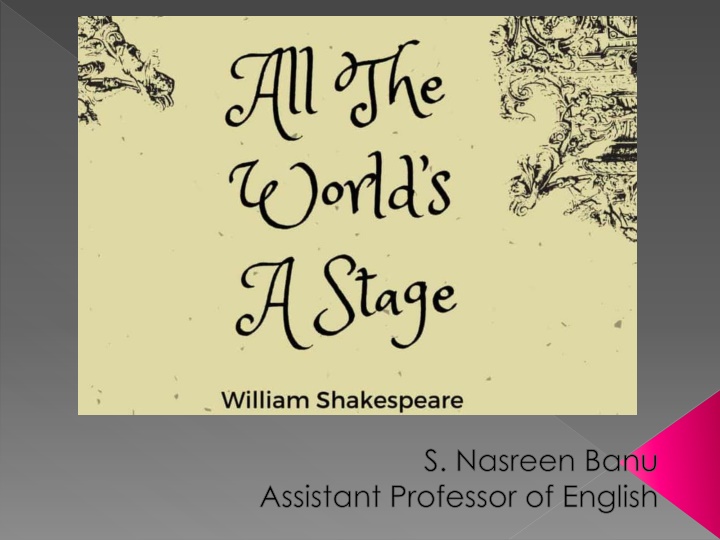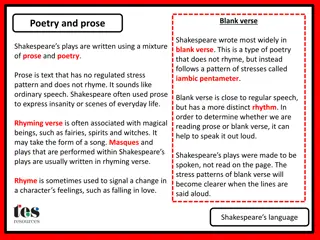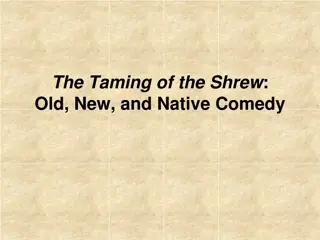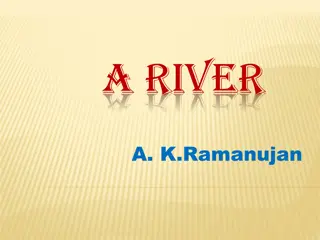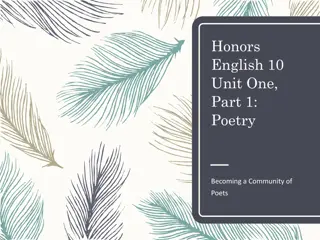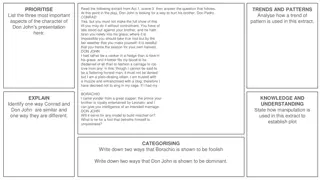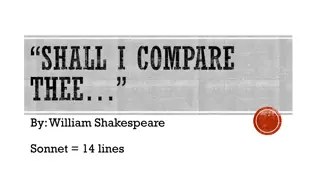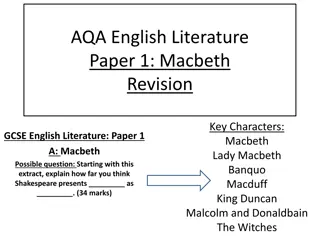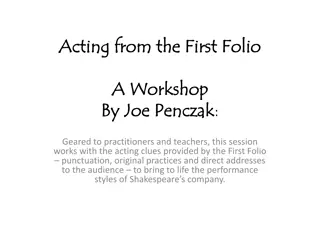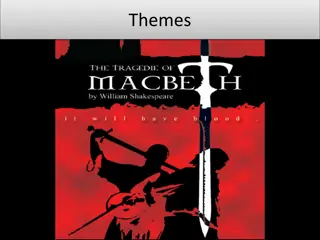Shakespeare's Poetic Form in Seven Ages of Man
Dive into Shakespeare's brilliant monologue "All The World's A Stage" from "As You Like It," as it beautifully portrays the seven stages of a man's life. Experience the vivid imagery and profound themes as life is compared to a theatrical performance, showcasing the fleeting nature of human existence through poetic eloquence. Explore the depths of this timeless piece and unravel the layers of meaning embedded within its verses.
Download Presentation

Please find below an Image/Link to download the presentation.
The content on the website is provided AS IS for your information and personal use only. It may not be sold, licensed, or shared on other websites without obtaining consent from the author.If you encounter any issues during the download, it is possible that the publisher has removed the file from their server.
You are allowed to download the files provided on this website for personal or commercial use, subject to the condition that they are used lawfully. All files are the property of their respective owners.
The content on the website is provided AS IS for your information and personal use only. It may not be sold, licensed, or shared on other websites without obtaining consent from the author.
E N D
Presentation Transcript
S. Nasreen Banu Assistant Professor of English
Poetic Form of All The Worlds A Stage All the world s a stage, And all the men and women merely players; They have their exits and their entrances, And one man in his time plays many parts, His acts being seven ages. At first, the infant, Mewling and puking in the nurse s arms. Then the whining schoolboy, with his satchel And shining morning face, creeping like snail Unwillingly to school. And then the lover, Sighing like furnace, with a woeful ballad
Poetic Form (Cont.) Made to his mistress eyebrow. Then a soldier, Full of strange oaths and bearded like the pard, Jealous in honor, sudden and quick in quarrel, Seeking the bubble reputation Even in the cannon s mouth. And then the justice, In fair round belly with good capon lined, With eyes severe and beard of formal cut, Full of wise saws and modern instances;
Poetic Form (Cont.) And so he plays his part. The sixth age shifts Into the lean and slippered pantaloon, With spectacles on nose and pouch on side; His youthful hose, well saved, a world too wide For his shrunk shank, and his big manly voice, Turning again toward childish treble, pipes And whistles in his sound. Last scene of all, That ends this strange eventful history, Is second childishness and mere oblivion, Sans teeth, sans eyes, sans taste, sans everything.
Introduction All The World s A Stage is a monologue from the maestro s As You Like It. This monologue is spoken by Melancholy Jaques in Act II Scene VII. As the speech begins, seven different stages of a man s life are all that can come into your mind. Each and every word is so beautifully written that you can actually imagine everything that is written, just like a movie running in front of your eyes.
Introduction (Cont.) The seven stages of a man s life also refer to The Seven Ages Of Man. These ages are infant, school- going boy, lover/husband, soldier/fighter, justice/ability to understand right and wrong, Pantalone (greediness and high in status), and old- age. In this poem, Shakespeare has compared life with a stage. He has used different words to beautify the poem in a wonderful way. He has taken this concept from medieval philosophy, which showed glimpses of several different groups as the seven deadly sins for theological reasons. Theology is the study of God s nature as well as religious belief.
Themes In All the World s A Stage Shakespeare discusses the futility man s place in the world. Everyone is simply a player in a larger game that they have no control over. Shakespeare brings this theme, and others such as the purpose of life, and aging, and youth. He takes the reader through the stages of life.
Tone and Mood In All the World s A Stage Shakespeare creates a somber mood and an even, a matter of fact tone. The speaker knows that this is the way the world is. We are all going to end up back where we started as children and there s no way to change that fact.
Poem Summary In the poem, Seven Ages of Man Shakespeare compares the entire world to a theatrical stage, where all the human beings perform their allotted role given by the God. Every individual has to go through seven acts that are seven stages of man s life. The first stage, in this phase of his life man, appears as a child in the world. As a child, he is a helpless creature. He cries in the arms of his nurse for one reason or the other. He cries and vomits.
Poem Summary (Cont.) The next phase of his life man appears as a child in the world. He goes to school with a bag hanging from his shoulder. He goes to the school creeping like a snail. He marches to the school unwillingly. In the third stage of his life, a man plays the part of a lover. He grows into a young man full of desires, ambitions, and dreams. He becomes a romantic young man. He falls in love and sights like a furnace. He begins to write sad poems to his beloved he cannot control his sad feelings.
Poem Summary (Cont.) In the fourth stage of his life man becomes a foul-mouthed soldier who has learned queer words at this stage, he tries to give himself a formidable look with a beard like a part. He is emotional and jealous. He quarrels with others for his honour and grace. He hankers after temporary and bubble fame.
Poem Summary (Cont.) In the fifth stage of his life, he becomes a judge. He becomes mature and experienced in his thoughts. The heat of youth has completely cooled down and he becomes very realistic. He wishes to grab wealth by foul or fair means. He begins to accept bribe and thus adds much to his material comforts. He becomes ease-loving and therefore becomes fat. His belly becomes round. He eats healthy fowls and chicken presented to him as a bribe. His eyes become severe and he grows the beard of formal cut.
Poem Summary (Cont.) Then, in the sixth stage of his life, man grows old. He looks quite ridiculous in his movements. He wears glasses because his eyesight is weak. His shoes become wide for his feet. His voice suffers a change. It becomes a shrill and quivering whistle. However, in the final stage, the man turns into a child once again. He seems to forget everything. He becomes toothless . His eyesight is weakened and he is deprived of taste. He is ready to leave this world.
Personal Commentary Personally, I feel that this poem also talks about the roles of other people in your life. Just like you are playing your part, so are they! They enter into your lives to teach you something new and leave, gifting you a bunch of memories to dwell upon.
